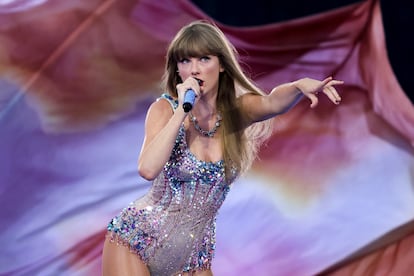Who do Taylor Swift fans vote for? A breakdown of Swifties by gender, age and ideology
Amid the speculation that the singer will endorse Democrat Joe Biden in an election against Donald Trump, EL PAÍS data expert Kiko Llaneras reviews what exactly is known about the artist’s followers

Can Taylor Swift influence the U.S. elections in November? This somewhat odd question has been making the rounds in the United States for weeks. The reason is simple: the artist is extremely well-known, has millions of fans, appeals to a key electorate (young white people), and unlike other celebrities who are discreet about their political preferences, Swift could once again publicly endorse a candidate, Democrat Joe Biden, just as she did in 2020.
I've looked for data to investigate this issue, starting with the basics: what do we know about Swift's fans?
We know a lot. The first thing is to confirm that there are a lot of them. Six percent of Americans declare themselves a “fan” of the singer; and up to a third of people call themselves at least “somewhat of a fan,” according to YouGov surveys. In this graph, I have shown the same data for different groups:
If we look at the declared fans — dark purple — we see that there are more of them among young people, people with upper-middle incomes, and those who live in the northeast of the country, which is where Taylor Swift is from. But it is interesting to see that she does not have significantly more white fans, and that nearly the same percentage of men are fans as women. Casual followers are even more heterogeneous: one in four 65-year-olds calls themselves “somewhat of a fan.”
The Pennsylvania singer has a varied mix of fans. That’s also true when it comes to politics. Taylor Swift said in 2020 that she would vote for Joe Biden, which obviously puts her closer to the Democrats, but that hasn’t stopped her from having Republican fans:
Ten percent of Democratic voters say they are a “fan” of Swift, as well as 6% of Republicans. That’s a lot of people on both sides of the political spectrum. What’s more, there would be almost as many Donald Trump voters among her fans as Biden voters in 2020.
It is curious to see that the ideological bias is greater among the “somewhat fans.” What is my hypothesis? On the one hand, I imagine that many of her true followers have been true followers for years, perhaps before the singer supported Biden, and they did not turn their backs on her. At the same time, there may be some Democrats who say they are “somewhat of a fan” because the singer supported their party.
Finally, let’s think about the possible influence of Taylor Swift in the November elections.
The first important thing is to remember that the artist is popular: 54% of Americans have a favorable opinion of her. She is more popular than Biden (48%) and Trump (41%), although her approval rating is lower than other celebrities, such as Morgan Freeman (80%), Will Smith (62%) and Michelle Obama (60%).
Furthermore, the graph above reflects a trend. This winter, Swift appears to have lost popularity among Republicans and independents. Possibly, as she has become more politicized due to the debate over whether she will endorse a candidate, being a fan has become a more polarizing issue.
But her endorsement is still an important asset for an election. First, because this process of polarization is not complete (half of those surveyed claim to not know if Taylor Swift is a Republican or a Democrat). And second, because even if the singer only appealed to the latter, she could still benefit Democratic interests, helping to boost turnout and push Democrats who have lost interest in the election — such as young people who are reluctant to vote for an 82-year-old — to vote.
So, will it matter if Taylor Swift endorses Biden?
I dare say yes. Based on the previous data, and also from this survey: 15% of Democrats and 4% of Republicans directly recognize that if Taylor Swift supports someone, it will make them more likely to vote for that person.
Sign up for our weekly newsletter to get more English-language news coverage from EL PAÍS USA Edition
Tu suscripción se está usando en otro dispositivo
¿Quieres añadir otro usuario a tu suscripción?
Si continúas leyendo en este dispositivo, no se podrá leer en el otro.
FlechaTu suscripción se está usando en otro dispositivo y solo puedes acceder a EL PAÍS desde un dispositivo a la vez.
Si quieres compartir tu cuenta, cambia tu suscripción a la modalidad Premium, así podrás añadir otro usuario. Cada uno accederá con su propia cuenta de email, lo que os permitirá personalizar vuestra experiencia en EL PAÍS.
¿Tienes una suscripción de empresa? Accede aquí para contratar más cuentas.
En el caso de no saber quién está usando tu cuenta, te recomendamos cambiar tu contraseña aquí.
Si decides continuar compartiendo tu cuenta, este mensaje se mostrará en tu dispositivo y en el de la otra persona que está usando tu cuenta de forma indefinida, afectando a tu experiencia de lectura. Puedes consultar aquí los términos y condiciones de la suscripción digital.









































